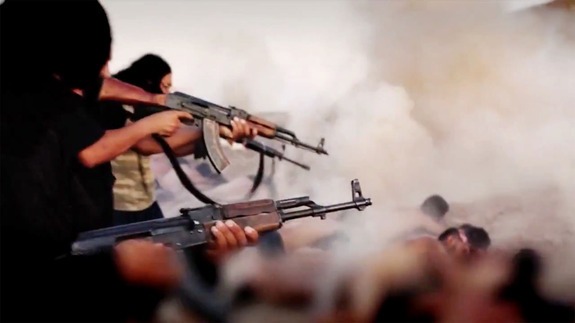
RNA - Iraqi officials said the men had been captured in the town of Heet, west of Ramadi, over the last week. All were members of the Sunni Albu Nimr tribe, which had faced off against Isis and had played a prominent role in fighting al-Qaida and its offshoots in Anbar province since 2007.
At least 60 more tribal members were killed in Heet earlier this week, in an execution videotaped and uploaded to the internet by the executioners.
Mass killings have become synonymous with the terrorists' rampage through western Iraq and eastern Syria, in which large numbers of captured soldiers and civilians on both sides of the border have been murdered and their bodies gruesomely displayed.
Human Rights Watch reported that up to 600 prisoners, all Shia, were executed when the group overran Iraq’s second city, Mosul, in June. The Shias were separated from Sunni prisoners and a small number of Christians, all of whom were spared. The NGO said it had spoken to 15 Shia prisoners who survived the massacre and said that those killed had been forced to kneel next to a ravine before being shot.
Since then up to 800 captured Syrian troops have been murdered after their bases were overrun in eastern Syria. And at least 1,000 Iraqi troops – all Shia – remain missing after they were captured in Tikrit.
Interior ministry intelligence chief General Ali al-Saede said Isis felt gravely threatened by a tribal revolt, which is seen as perhaps the only way to force it from large parts of the country it has conquered.
Advertisement
“They are trying to consolidate in the desert areas and in Falluja and Ramadi,” he said in an interview. “They know that the tribes are allying with us and that will be their downfall.”
Iraqi officials are trying to raise a national guard that would be led by Sunni tribal leaders and partnered with the beleaguered national army. However, tribal leaders say they have yet to be formally approached about the idea and that their fight against Isis is largely piecemeal. “Nobody has talked to me about a new awakening, of forming a national guard,” said Sheikh Ahmed Abu Risha, the leader of a tribal revolt in Anbar in 2007 that forced an earlier incarnation of Isis to leave the province.
“If they did, they would know that we need a lot more than we have now to fight them properly.”
Meanwhile, in north-eastern Syria around 100 Kurdish peshmerga have assembled near Kobani, on the border with Turkey, to reinforce Kurdish fighters who have been battling Isis for more than a month. Kobani, which is known as Ain al-Arab in Arabic, has been a key battleground in Syria’s civil war.
R111/108/B/